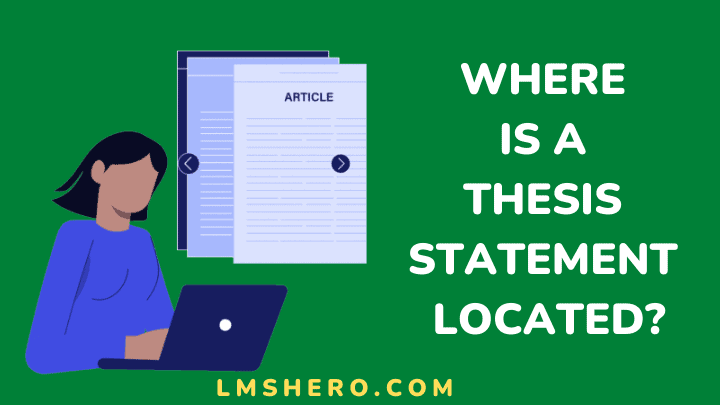Different schools of thought can make it difficult for a researcher to determine where a thesis statement is located in an essay or research project.
When you write a thesis statement, you aim to provide a concise and expressive message about the topic of your paper or essay.
It is a focal point for your argument and should be clearly defined in the introduction.
This article will explore the ideal position for your thesis statement and some tips on writing a strong one.
What is a thesis statement?
A thesis statement is a simple, lucid, and memorable assertion of what you are trying to argue in your essay or paper. It states the main idea of your essay or paper.
The most important thing about this statement is that it needs to grab people’s attention and entice them to continue reading.
For your thesis statement to work well for you, it needs to have three things: passion, purpose, and insight.
Passion is needed because without it, readers won’t care about what you’re saying or why they should keep reading.
Purpose comes into play because readers need an understanding as to why they should even care in the first place. Insight tells the reader why they should continue reading.
The thesis statement will often include phrases like “in conclusion” or “as I have argued”, but as with all things in writing, it should be tailored to your particular essay or paper.
What is the main purpose of a thesis statement?
The purpose of the thesis statement is to tell readers what you’re arguing or trying to prove in the paper.
It tells them what they can expect to read, but it also gives them an idea of whether or not your argument is valid.
It includes the writer’s dominant impression, opinion, or significance of the topic for subjective essays. Furthermore, it may include key backing points.
Another purpose of this statement is to provide information about how a research plan supports an argument.
It helps people know if they can trust your words or if they should take them with a grain of salt.
Where is the thesis statement located in an essay?

In most cases, the thesis statement appears at the end of the introductory paragraph.
Typically, it is written in a single sentence, but if the essay is especially long and complex, it may be divided into two or three sentences.
What are the types of thesis statements?
If you’re writing an essay of a particular kind, your thesis statement should match the goals of the essay as described below:
1. Argumentative thesis statement
An argumentative thesis statement provides a reason for which one conclusion is true based on evidence.
Thesis statements can be used to persuade the reader to accept a claim or to support a claim by providing evidence. They should be specific, well-grounded, and supported by evidence.
This type of statement aims to convince the reader that the result is based on evidence and rational reasoning.
Example: “The best time to study is during the day.”
2. Expository thesis statement
Expository thesis statements state facts and/or opinions about something that is not directly related to the main topic of study.
This type of statement often presents information such as how a certain event happened, what it means, how it affects people, etc.
The aim is to explain something in detail and does not need to include a strong opinion or perspective.
Example: “Cybercrimes have increased over the years due to increased use of the internet, remote work, and digitization. Hence, there’s a need for cybersecurity training”.
How to craft a catchy thesis statement?
1. Think about the topic you are researching
It is essential to think about the topic you are researching. This is because it will help you identify the strengths and weaknesses of your plan and give you a starting point for your research.
What is your opinion on the topic? Is there any justification for the study? What are the scope and limitations of the study? When beginning to craft a strong thesis statement, these are all questions you should ask yourself.
If you don’t know anything about the subject matter, it’s hard to write about something with conviction.
Plus, if you have no experience or knowledge about it, your reader will be able to tell and won’t trust what you’re saying.
2. Develop a thoughtful argument
A thoughtful argument is vital for crafting a strong thesis statement because it creates a solid foundation for your argument.
With one, it’s easier for the reader to know your opinion on the topic. They may also think you are just throwing out information without knowing why or how it relates to the subject.
A well-developed and carefully thought-out essay will convince the reader of your point of view.
3. Research the topic thoroughly
Knowing what you’re writing about is one of the essential steps toward writing a strong thesis statement. So make sure you do your research before you start drafting your thesis.
It would help if you had strong critical thinking and problem-solving skills. It will help you avoid making assumptions or relying on unsubstantiated claims.
By getting as much information as possible about the topic, you’ll be able to develop a sound argument and present it accurately and persuasively.
4. Include persuasive evidence to support your thesis statement
Persuasive evidence is any information that helps support your thesis statement. It can come from statistics, facts, figures, examples, or even personal experience.
When including persuasive evidence, make sure it’s clear and easy to understand.
Keep in mind that persuasive evidence should be used sparingly. Too much persuasive evidence can dilute your argument, making it difficult for readers to follow.
Instead, use persuasive evidence to strengthen your argument, not to prove it.
5. Make sure to write in a clear and easy-to-read format
Clear and concise writing is key to a strong thesis statement. With a clear overview of your argument, readers may be able to understand your position.
Always aim for clear, straightforward language to ensure your message is easily understood and conveyed.
This will not only make your writing more effective, but it will also help you avoid common mistakes that can lead to confusion.
Key takeaway
The best thesis statements are:
- Straightforward: One or two sentences should be enough to convey your point clearly and directly. Avoid fluff.
- Argumentative: Do not simply state a fact that everyone knows. A good thesis needs to provide solid backing with evidence to support it.
- Reliable: Your paper must support and explain everything you mention in your thesis statement.
FAQs
How long should a thesis be?
An ideal master’s thesis should be about 50 – 80 without the preliminary pages. In addition, a Ph.D. dissertation should be about 70 -100 without the preliminary pages.
How many sentences is a thesis statement?
The length of a thesis statement depends on how many points are included. Nonetheless, it is only one concise sentence which should be at least two lines and less than 30 words.
Is a thesis statement a question?
No. You can’t turn your thesis statement into a question because questions don’t make a statement or come to conclusions.
Final thoughts
A thesis statement is a sentence or two that declares the main idea of academic research. While there may be some debate surrounding its usefulness and validity, it is an important part of any research paper.
It is one of the most important tools you have as an author, and it’s important to get it right.
Using a clear and concise thesis statement allows readers to understand the main points of your paper immediately.
Additionally, it can help you focus your research while avoiding jargon and abstract concepts.
A good thesis statement will be consistent with the themes and ideas of your work, make a clear point, and state your overall purpose.
Finally, for most students, having a unique thesis or research paper means not having plagiarized texts. However, most students paraphrase the texts to make them correct and creatively unique.
But is paraphrasing plagiarism? Read the article highlighting the differences and importance of learning more about paraphrasing.
Thanks for reading.






